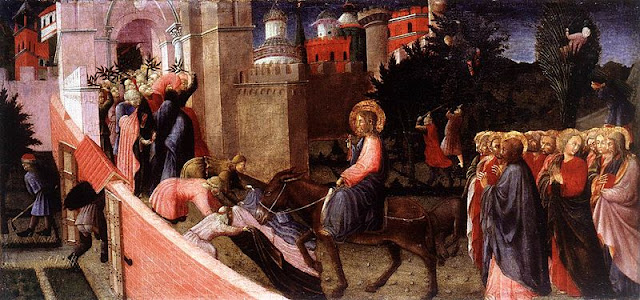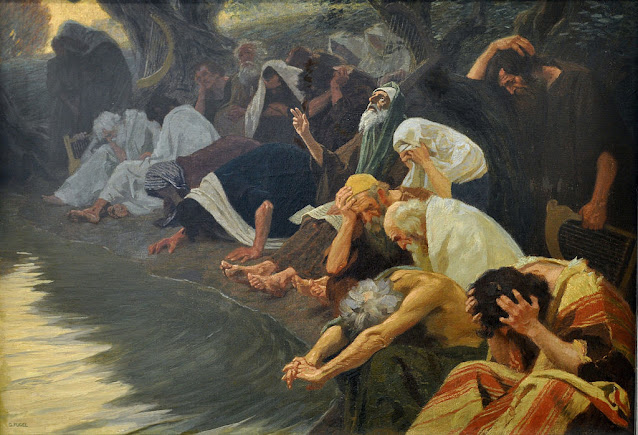The days are getting longer and warmer. Spring is in the air. This time of year, I always feel inspired to do a little spring cleaning – not just to actually clean, but to go through my things and see what I no longer need. Living more simply often means living more happily.
Lent is a great time to do this: to look at the stuff that has accumulated that we don’t need – whether material things, like books or clothes, or spiritual ones, like sins and bad habits. In today’s Gospel, Jesus cleanses the Temple. As ardently as he sought to purify his Father’s house, he even more ardently desires to purify us as well, we who are temples of the Holy Spirit, as St. Paul tells us. Our mother the Church calls us to do a little spiritual house-cleaning, at least once a year: to unburden ourselves of what has accumulated in our souls, to give it over to God, and to hear the healing words of God’s mercy spoken to us. The Sacrament of Penance, Reconciliation, Confession – it goes by different names but whatever we call it, it is one of God’s greatest gifts and one of the most important pieces of our spiritual well-being. When we confess our sins and receive sacramental absolution, we are once again purified by the saving blood of the Cross and restored to right relationship with the Lord.
 |
| Expulsion of the Moneychangers from the Temple (c. 1675) by Luca Giordano |
Today, I would like to share a few tips on how to make a good confession. I hope they are especially timely since we have our Lenten Penitential Service this coming Thursday at 6:30 p.m. here in the church. If you can’t make it this Thursday, I hope you do avail yourself of this great sacrament in the next few weeks. I guarantee it will make your Easter a more blessed one.
1. Why do we confess to a priest? Because Jesus commanded it. “Whose sins you forgive are forgiven them, and whose sins you retain are retained” (Jn 20:23). When we confess our sins to a priest, we confess them to Jesus. In confession, it is Jesus who acts through the priest, using him as an instrument to give us his mercy in a clear, perceptible way. The priest also is a representative of the whole Body of Christ that was harmed by our sins and who welcomes us back into the fullness of grace.
2. Examine your conscience thoroughly before you enter the confessional. Have an idea of what you want to say; it’s not helpful if you’re trying to think on the spot. If you have trouble remembering, take a deep breath and reflect; or feel free to write them down and read from a list. That’s not a problem – just make sure you destroy the list afterward!
3. Start your confession by mentioning how long it has been since your last confession and what your state in life is. “Bless me, Father, for I have sinned. It’s been two months since my last confession. I’m a 60-year-old father and grandfather.” Or “Bless me, Father, for I have sinned. It’s been three weeks since my last confession. I’m a 25-year-old single woman.” You don’t have to reveal your complete identity, but providing a short description of your state in life gives the priest some context for the sins you will confess.
4. What must we confess? All mortal sins in kind and number. “Mortal sins” are sins that are gravely wrong which we do knowingly and deliberately and which therefore separate us from God’s grace. “Kind” is the nature of the sin: e.g. “I missed Sunday Mass because I was lazy,” “I ate meat even though I knew it was a Friday in Lent,” “I looked at impure pictures on the internet,” “I drank immoderately.” “Number” is how many times you did those things. If you can’t remember exactly, give an approximate idea (“a few times since my last confession”) or at least its frequency (“probably about once a week”). In addition to all of our mortal sins, we can also confess venial sins generally, without the number.
5. It is helpful to say first the sin that you most feel guilty about or are afraid of confessing. It makes the rest of your confession easier, and it gives the priest time to think of a word of helpful advice. We also can usually tell if you are hesitating about saying something, so not holding back gets to the heart of your confession more quickly. Never hold back a sin out of shame or fear; it will corrupt your whole confession, and you won’t be forgiven of that sin or any other!
6. Giving some context for your sins can be helpful, but the priest usually doesn’t need to hear the whole story. Try to be direct, precise, and brief when you tell your sins, especially if you know Mass will be starting shortly, or if there are others waiting behind you in line. At the same time, it’s important not to be too vague. “Father, I sinned in word and action.” Okay, how? “I watched something bad.” That could mean a lot of things: a video with foul language, pornography, an overly violent movie? “I had bad thoughts.” Impure thoughts, hateful thoughts, violent thoughts? About yourself or another? Again, we don’t have to describe the whole scenario, but it’s important to give enough information that the priest knows what we’re talking about.
7. It is important to realize that emotions and sins don’t always go together. You may feel bad about having had to reprimand your child, for example, but maybe it was the right thing to do. Just because you feel bad, doesn’t mean you necessarily need to confess it, but look underneath that bad emotion to see if you did something wrong. It also can happen that if we are habitually committing a serious sin – a sexual sin, for example, or missing Mass on Sunday, or receiving the Eucharist unworthily – we may no longer feel bad about it, but it is still doing us grave harm every time.
8. Be sure to confess your sins, not other people’s sins. You aren’t there to explain about why your daughter did something that made you get angry, or why your neighbor deserved the uncharitable comment that you said. Focus on yourself and your relationship with God. It’s also not necessary to tell the priest that you know what you did is wrong and you’re trying to be better. We assume that already – that’s why you’ve come to confession, praise God!
9. The Sacrament of Reconciliation is about receiving mercy; it is not the time to ask for life counsel or have a chat about your spiritual life. We priests are glad to do those things, but it’s best they are done outside of the sacrament. Make an appointment when the priest has more time, when Mass isn’t starting in a few minutes, and when there aren’t people waiting behind you in line. Remember that confession can always be done during such an appointment if needed.
10. Realize that whatever you tell the priest in the confessional he cannot repeat. This is helpful, of course, in that the priest can never reveal your sins to anyone else, no matter who asks or what consequences he may face. But it also means that if you share with him some personal difficulty or painful family situation, he won’t be able to ask you about it later. He might want to, but the seal of the sacrament prevents him from doing so. That’s another good reason to make an appointment for later or at least be sure to tell him again outside of confession of important things going on in your life.
11. Don’t be afraid to ask for help at any point, especially if you are a new Catholic, or if it has been a while since you have made a confession. It’s also helpful to let the priest know if you struggle with something like scrupulosity, or if a sin has become a habitual one, since it may mean that your will is no longer completely free.
12. After your last sin, say “for these and for any other sins that I may have forgotten”; that helps the priest realize you’ve finished your confession. Then the priest may give you some brief counsel about one or more of your sins. He will give you a penance (which you have the right to ask for a different one, if you like), and then you will say an act of contrition, and finally he wil pray the prayer of absolution, which actually forgives your sins. If you realize later you forgot a sin – honestly forgot – you can trust it was forgiven, but mention it the next time you go to confession in case the priest can say something helpful. When you leave the confessional, do your penance right away.
 |
| Ludwig Passini, A church interior with women at the confessional (1863) |
A final bit of advice, and probably the most important: Relax. Don’t be afraid. Jesus died for you. He loves you, and so does the priest. The priest is there to help you, not to judge you unfairly. He’s a sinner, too. Most of us priests forget the sins we hear almost immediately, and even if not, it is always much more inspiring to see a person trying to be holy than one who never comes to confession at all. Never be afraid of confession because of what someone else may think, even a priest. Focus instead on what Jesus thinks. He wants to meet us there; he wants to help us live more simply, more happily, free from our sins. We have much more to fear from our sins themselves than we do from the sacrament by which God frees us from them.
May our encounter with our saving Lord in this Eucharist inspire in us a true repentance of our sins and the boldness to seek him anew in the Sacrament of Mercy.




